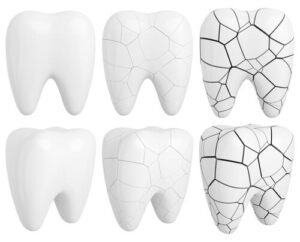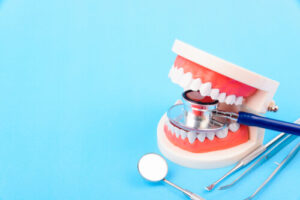The journey of a wisdom tooth rotting and breaking is a dental concern that affects many yet remains shrouded in mystery for most until it directly impacts them. Situated at the back of the mouth, wisdom teeth are the last to emerge and often the first to encounter problems, including decay and structural damage. This article delves into the complexities surrounding why wisdom teeth break and tooth deterioration, offering insights into why these issues arise and hinting at the multifaceted approaches to treatment and prevention.
As we unravel the layers of this dental predicament, we invite you to explore the critical importance of quick intervention and the role of professional care in preserving your oral health amidst the challenges posed by rotting and breaking wisdom teeth.
Wisdom Tooth Rotting and Breaking Explained
Wisdom teeth, or third molars, emerge as the final set of molars. Due to their position in the mouth and the limited space for growth, wisdom teeth often lead to a host of dental problems. Complications such as rotting and breaking rotten wisdom teeth are not uncommon, stemming from decay, impacted growth, or physical damage. These issues can lead to severe pain, infection, and negative effects on overall oral health. Understanding the nature of these complications is crucial for early intervention and prevention.
Decay and Rotting: Wisdom teeth are prone to decay due to their hard-to-reach location, making them difficult to clean effectively. This can result in cavities or rotting, which can lead to serious infections or abscesses.
Treatment Options: Addressing these complications might involve simple or complex extraction procedures, root canal treatments, or crown placement to preserve tooth structure and function. Consulting with a dental professional is essential for determining the most appropriate course of action.
Causes of Wisdom Tooth Decay and Structural Damage
Wisdom teeth, or third molars, are the last to emerge in the mouth and often present unique challenges due to their position and the limited space available to grow properly. These challenges can lead to various complications, including decay and structural damage to broken wisdom teeth, which not only cause discomfort. Still, they can also have broader implications for overall dental health. Identifying the factors contributing to these issues is the first step in prevention and management.
Poor Accessibility for Cleaning
The place of wisdom teeth at the back of the mouth makes them particularly difficult to clean effectively with standard brushing and flossing. This poor accessibility can lead to plaque buildup, ultimately resulting in decay.
Impaction
Wisdom teeth often become impacted due to insufficient space in the jaw. Impacted wisdom teeth can grow at awkward angles, sometimes remaining partially or completely trapped beneath the gum line, creating pockets where bacteria can thrive and cause decay.
Physical Trauma
Accidental biting on hard foods, sports injuries, or other forms of physical trauma can lead to cracks, chips, or fractures in wisdom teeth. These cracks can weaken their structural integrity and making them more susceptible to decay.
Dietary Habits
Consuming foods and beverages high in sugar and acid can contribute to tooth enamel erosion, accelerating decay. Sticky or hard foods can also cause physical damage to wisdom teeth, increasing the risk of cracks and breaks.
Genetic Factors
Some individuals may be genetically predisposed to dental problems, including a higher susceptibility to tooth decay and gum disease, which can affect wisdom teeth and other teeth in the mouth.
Recognizing the Signs: Symptoms of a Rotting and Breaking Wisdom Tooth

Recognizing the signs and symptoms of rotting and breaking of wisdom teeth removed a tooth is critical for timely intervention and preventing further oral health complications. As the last set of molars emerges, wisdom teeth are susceptible to various issues, including decay and structural damage, which can lead to significant discomfort and impact overall well-being. Being aware of the symptoms associated with these conditions allows individuals to seek professional dental care before the problems escalate.
Persistent Pain and Discomfort: One of the most noticeable signs of a problematic wisdom tooth is ongoing pain or discomfort in the back of the mouth, which may worsen when chewing or biting.
Swelling and Redness: Inflammation around the affected area, including redness and swelling of the gums, can indicate infection or decay in a wisdom tooth.
Visible Decay or Damage: Physical changes such as holes, cracks, or chips in a wisdom tooth indicate structural damage or decay.
Bad Breath or Unpleasant Taste: An ongoing bad taste in the mouth or chronic bad breath, despite good oral hygiene practices, can be symptomatic of rotting in the wisdom tooth.
Difficulty Opening the Mouth: In some cases, decay or damage to a wisdom tooth can lead to stiffness in the jaw, making it difficult to open the mouth fully.
Sensitivity to Temperature: Experiencing sensitivity to hot or cold foods and beverages can signal decay or exposed nerves in a wisdom tooth.
The Impact of Neglected Wisdom Tooth Issues on Overall Oral Health
If you notice a cracked tooth or a chipped wisdom tooth, you must see a dentist immediately to prevent further damage and address any potential pain or infection. Neglecting wisdom teeth removal and tooth issues can profoundly impact overall oral health, leading to a cascade of problems that extend far beyond the affected tooth itself. Due to their position and the complexity of their emergence, wisdom teeth are prone to various complications, including decay, impaction, and structural damage.
When these issues are overlooked, the consequences can jeopardize not only the health of the wisdom teeth but also the well-being of the entire mouth, underscoring the importance of promptly addressing wisdom tooth problems.
Spread of Infection
Untreated decay or damage in a wisdom tooth can lead to infection, spreading to surrounding teeth, gum tissue, and even bone, causing more extensive oral health issues.
Gum Disease
Neglected wisdom tooth problems often contribute to the development of gum disease around the affected tooth. This disease can then spread to other areas of the mouth, potentially leading to tooth loss and bone degradation.
Misalignment of Teeth
Impacted wisdom teeth, or those that grow in at an angle, can exert pressure on adjacent teeth, leading to misalignment or crowding, affecting the bite and requiring orthodontic intervention.
Cysts or Tumors
In some cases, cysts or tumors can develop around an untreated impacted wisdom tooth, requiring more invasive surgical procedures to resolve and potentially causing damage to the jawbone.
Chronic Pain
Issues with wisdom teeth can lead to ongoing discomfort or pain, affecting eating, speaking, and overall quality of life.
Difficulty Maintaining Oral Hygiene
Complications with wisdom teeth can make it challenging to maintain effective oral hygiene, increasing the risk of further decay and gum disease.
Professional Treatment Options for Rotting and Breaking Wisdom Teeth

Addressing the rotting and breaking of wisdom tooth break back teeth through professional treatment options is crucial for preserving oral health and preventing further complications. Wisdom teeth, positioned at the back of the mouth, are susceptible to various problems due to their late eruption and potential for impaction, decay, and structural damage. Professional dental care provides a range of treatment options tailored to the specific condition of the wisdom tooth, ensuring effective management and relief from symptoms.
Wisdom Tooth Extraction
Often, the most definitive treatment for severely damaged, decayed, or broken teeth is to remove the tooth entirely to prevent further issues. This can be a simple tooth extraction above the gum line or a surgical extraction for impacted teeth.
Root Canal Treatment
If the tooth structure allows it and the tooth is deemed valuable for preserving, root canal therapy may be performed to remove the infected pulp and seal the tooth, especially if the decay has reached the tooth’s nerve.
Crowns
For wisdom teeth that have suffered breakage but remain largely intact, a dental crown can be placed to restore the tooth’s shape, size, and function, protecting it from further decay and damage.
Antibiotic Treatment
In cases where infection is present, antibiotics may be prescribed before or after extraction or other procedures to clear the infection.
Pain Management
Effective pain management strategies, including over-the-counter pain relievers and prescription medications, can provide relief during the treatment and healing process.
Gum Disease Treatment
If gum disease has developed around the wisdom tooth, treatments ranging from deep cleaning (scaling and root planing) to more advanced periodontal therapies may be necessary.
Preventive Measures: How to Protect Your Wisdom Teeth from Decay and Breakage
Preventive measures to protect wisdom teeth from decay and breakage are essential for maintaining long-term oral health. Wisdom teeth, or third molars, are particularly vulnerable to problems due to their position in the mouth and the challenges associated with their eruption. Proactive care and preventive strategies can significantly reduce the risk of decay and structural damage to cracked wisdom, preserving these teeth and the mouth’s overall health.
Regular Dental Check-ups
Frequent visits to the dentist for check-ups and cleanings allow for early detection of potential problems with wisdom teeth and the implementation of preventive measures before issues become serious.
Proper Oral Hygiene
Maintaining a rigorous oral hygiene routine, including thorough brushing twice a day, flossing daily, and using an antiseptic mouthwash, helps prevent plaque buildup that can lead to decay and gum disease.
Fluoride Treatments
Professional fluoride treatments can strengthen tooth enamel, making wisdom teeth more resistant to decay.
Protective Dental Sealants
Applying dental sealants to the chewing surfaces of wisdom teeth can prevent food particles and bacteria from getting trapped in the crevices, reducing the risk of cavities.
Use of Mouthguards
For individuals who participate in sports or have a habit of grinding their teeth, using a mouthguard can protect wisdom teeth from physical damage.
In wrapping up our discussion on wisdom tooth rotting and breaking, it’s clear that understanding the causes of broken wisdom tooth pain, recognizing the symptoms, and seeking prompt, professional treatment is key to mitigating the impact of these common dental issues. Neglecting the health of your wisdom teeth can lead to more than just discomfort; it can have serious implications for your oral health. Whether through preventive measures or timely intervention, taking steps to protect your wisdom teeth from decay and breakage is essential.
Remember, the health of these final molars is an integral part of maintaining a healthy, happy smile. So, prioritize wisdom tooth care in your dental routine before pain or problems arise.
References
Broken Wisdom Tooth: Adverse Side Effects If Left Untreated
https://www.colgate.com/en-us/oral-health/dental-emergencies-and-sports-safety/broken-wisdom-tooth-adverse-side-effects-if-left-untreated
Impacted Wisdom Teeth: Symptoms, Signs, Removal
https://my.clevelandclinic.org/health/diseases/22296-impacted-wisdom-teeth
Wisdom tooth removal
https://www.nhs.uk/conditions/wisdom-tooth-removal/
Wisdom teeth
https://www.betterhealth.vic.gov.au/health/conditionsandtreatments/wisdom-teeth
Impacted Wisdom Tooth: Treatment, Recovery, and More
https://www.healthline.com/health/impacted-wisdom-tooth
